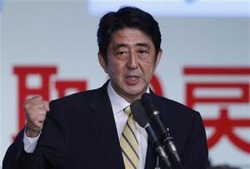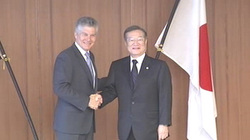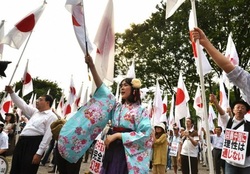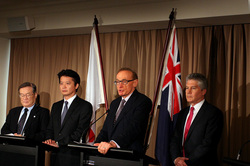 Reuters Photograph
Reuters Photograph This state of affairs did not sit well with regional representatives, particularly those from Akita Prefecture (namely Ono Chueimon, Shibuya Masatoshi, and Kawaguchi Hitoshi), along with Kato Koichi of Yamagata Prefecture. Despite Ishiba winning a majority of regional votes, it appears the LDP executive believed that only Diet members should have ultimate say over the next president of the party, leading Shibuya to address the media wondering why the party went to the trouble of including regional representatives in the latest election process at all (J). So furious were they with their party's decision that all four representatives soon after resigned from the LDP, a move that was followed by tweets from Tokushima Prefecture representative Kitadai Masafumi wondering aloud when Abe would quit (in his words..."Will the reason have changed from diarrhea to constipation this time around?" - Kitadai, having thought better of it, soon after closed his Twitter account) (J).
The fact that Abe has subsequently appointed many of his old Cabinet colleagues back to positions of importance in the party hasn't won him too many supporters either, with voices raising concern that by appointing Amari Akira (former Agriculture Minister under the Abe Cabinet), Shiozaki Yasuhisa (former Chief Cabinet Secretary in the Abe Cabinet), and Suga Yoshihide (former Minister for Internal Affairs and Communications in the Abe Cabinet), Abe was merely surrounding himself with sycophants rather than talented politicians that could tackle the DPJ (J). The appointment of Ishiba to Chief Secretary of the LDP will be regarded as a consolation prize of sorts, although just what effect this will have on the LDP's re-election chances will become more apparent as the general election period grows closer (J).
That Abe has not yet outlined his policy for dealing with low economic growth, reconstruction, debt reduction, not to mention the LDP's objections to Japan joining the TPP do not augur well for a party that has yet to inspire confidence in its ability to tackle Japan's present dilemmas. What Abe has done is ratchet up rhetoric on the need for a strong security relationship with the US, and not giving an inch in territorial disputes with China and South Korea. While this may win Abe supporters among constitutional revisionists, it doesn't address the more pressing concerns faced by the average Japanese citizen. Abe's election may also finally convince the public that there is no future in the LDP, that it has simply run out of ideas, is plagued by factional divisions, and has become a prisoner of its own devising in its close ties to industry and rural producers.
If Abe can reinvent himself and his party to make it more relevant to the task of re-inventing the nation, then he might just secure the legacy that he is so keen to create, but don't hold your breath. The difficult part has only just begun, and Abe's track record in dealing with difficulties does not inspire confidence.




 RSS Feed
RSS Feed